The Venet Foundation launches second summer season with a show dedicated to Jean Tinguely’s final collaborations with Yves Klein
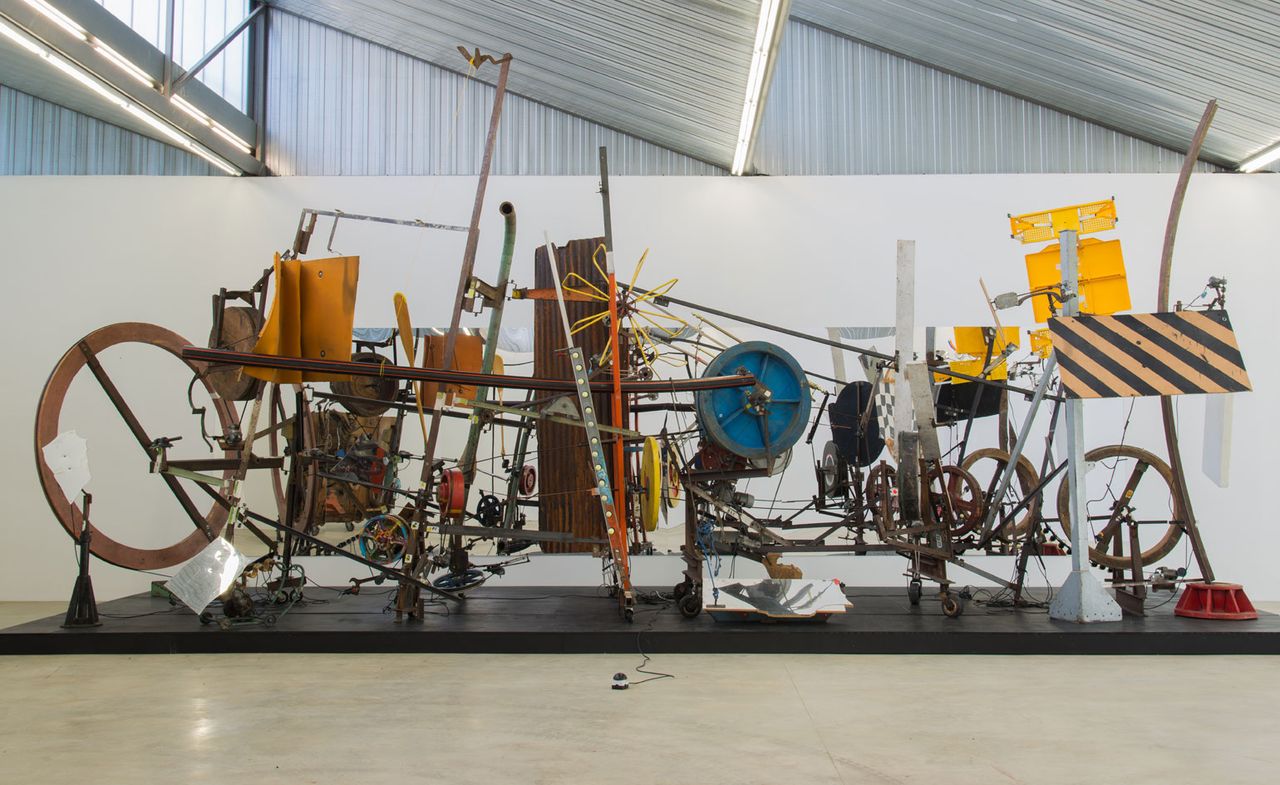
Last year at the age of 73, legendary French artist Bernar Venet quietly opened the doors to his Venet Foundation, a sculpture park and gallery housed in a former factory next to the leafy village of Le Muy in the Var region of France.
Dedicated to minimalist art produced in and after the 1960s, the pieces on show comprise his own works as well as pieces from his own 100-strong collection, most of which he acquired informally, through longstanding friendships with fellow art world luminaries such as Donald Judd, Richard Serra, Sol LeWitt, Carl Andre and Richard Long among many others. While Jean Tinguely created a baroque candlestick for his fiftieth birthday, Kawara, who Venet regularly got together with to play ping pong, sent him a series of ‘I got up at’ postcards every day for the month of December 1969. The list goes on.
'Soon after my arrival in New York [where Venet lived for a time in the 1960s], Christo did a wrapped portrait for me, and in exchange I offered him a Diagram painting, which I see each time I visit him. That was the spirit in which my collection began to take shape.'
This summer, the Venet Foundation launches its second summer season with a show dedicated to the work of artist Jean Tinguely and called 'Tinguely – The final collaborations with Yves Klein'.
Curated by the Foundation's director, Alexandre Devals, the show showcases two important pieces from Tinguely's vast body of, in his words, 'machines that serve no purpose,' including his final collaboration with Yves Klein (1988). On loan from the Tinguely Museum in Basel, the complex structure of scrap iron, foam, wooden wheels, bulbs, electric engines is set up in front of a series of mirrors that lend it an uncertain depth.
In addition to the machines, a film about Jean Tinguely will also be screened in a dining room featuring a table, eight chairs and a light fixture, all designed by the artist for the Tinguely Café in Kyoto and recreated especially for the Venet Foundation. Like most of the Foundation's featured artists, Bernar Venet often ran into Tinguely on the streets of New York in the 1960s. Venet remembers '[For me], Tinguely’s importance on the art scene, his originality as a sculptor, and his ambition, pushed his work well beyond traditional approaches, are a source of great admiration.'
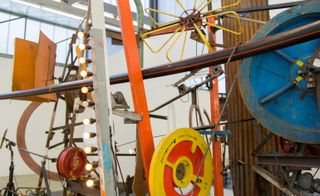
On loan from the Tinguely Museum in Basel, the complex structure of scrap iron, foam, wooden wheels, bulbs, electric engines is set up in front of a series of mirrors that lend it an uncertain depth. Courtesy of Tinguely Museum, Basel, Switzerland
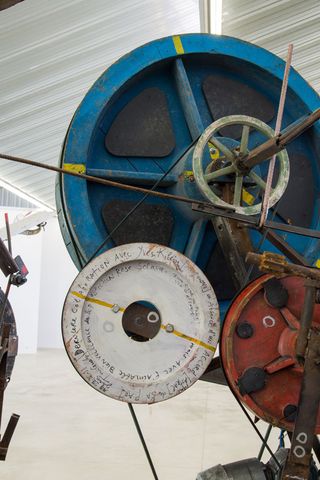
'Tinguely - The final collaborations with Yves Klein' includes, his famous machines 'that serve no purpose', as he called them, including his final collaboration with Klein. Courtesy Musée d’Art Moderne et d’Art Contemporain de Nice
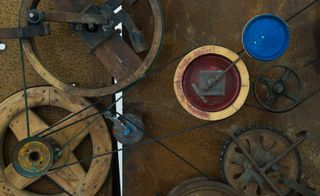
In addition to the machines, a film about Jean Tinguely will also be screened in a dining room featuring a table, eight chairs and a light fixture, all designed by the artist for the Tinguely Café in Kyoto and recreated especially for the Venet Foundation. Courtesy Musée d’Art Moderne et d’Art Contemporain de Nice
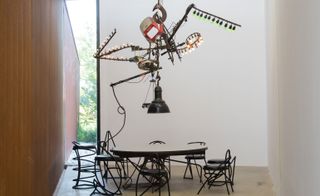
Venet remembers '[For me], Tinguely’s importance on the art scene, his originality as a sculptor, and his ambition, pushed his work well beyond traditional approaches, are a source of great admiration.' Courtesy Tinguely Museum, Basel, Switzerland
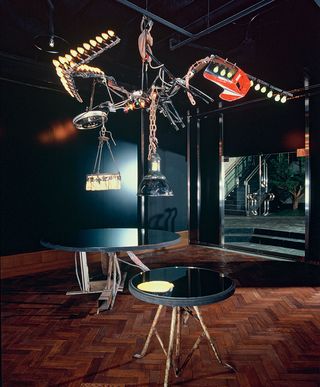
The Venet Foundation, a sculpture park and gallery housed in a former factory next to the leafy village of Le Muy in the Var region of France, is dedicated to minimalist art produced in and after the 1960s
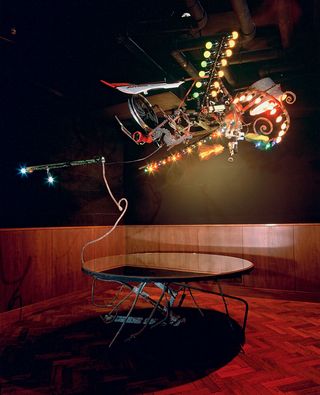
View of Jean Tinguely's Table Kyoto, 1987. Courtesy Tinguely Museum, Basel, Switzerland
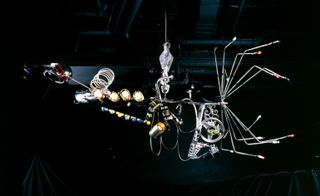
Mirrors and an assortment of scap iron, bulbs and even an electric engine give Lampe Kyoto a rather rustic feel. Courtesy Tinguely Museum, Basel, Switzerland
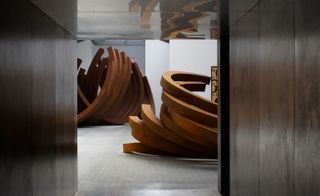
The steel corridor of the factory, Courtesy Bernar Venet Archives, New York
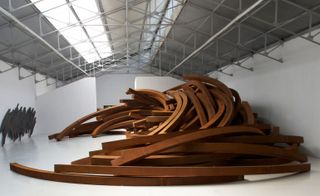
Bernar Venet's work is also on show at the sculpture park. Pictured here: Effondrement to the rigth and GRIB, to the left.Courtesy Bernar Venet Archives, New York.
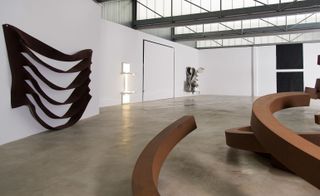
View of the collection in the gallery with Robert Morris, Dan Flavin, Frank Stella, Richard Serra, Carl Andre and Bernar Venet, Courtesy Bernar Venet Archives, New York.

Daniel Buren Grille de lecture: recto-verso, in situ work, Courtesy Bernar Venet Archives, New York and DB-ADAGP Paris
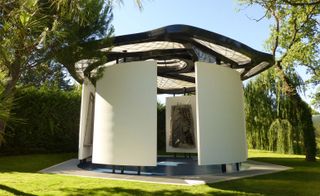
Stella Chapel, built in June 2014 in the sculpture park of the Venet Foundation, Courtesy Bernar Venet Archives, New York.
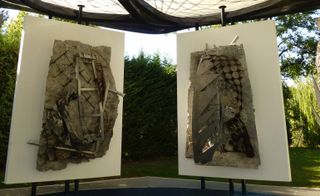
View from within the Stella Chapel, Courtesy Bernar Venet Archives, New York
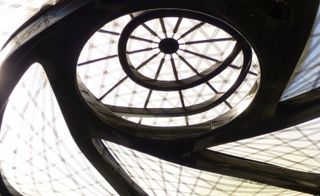
A dome-like spiral floods the Stella Chapel with light, Courtesy Bernar Venet Archives, New York.

The tube bridge, by Bernar Venet, at his eponymous foundation, Courtesy Archives Bernar Venet, New York.
ADDRESS
365 Chemin du Moulin des Serres
83490 Le Muy
Wallpaper* Newsletter
Receive our daily digest of inspiration, escapism and design stories from around the world direct to your inbox.
Ali Morris is a UK-based editor, writer and creative consultant specialising in design, interiors and architecture. In her 16 years as a design writer, Ali has travelled the world, crafting articles about creative projects, products, places and people for titles such as Dezeen, Wallpaper* and Kinfolk.
-
 The Wallpaper* Design Issue comes with our Salone del Mobile must-sees
The Wallpaper* Design Issue comes with our Salone del Mobile must-seesThe May 2025 issue of Wallpaper* is on sale now, taking in Milan Design Week, the Venice Biennale, and a very stylish tea party
By Bill Prince Published
-
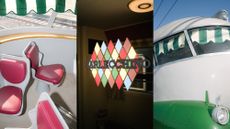 Aboard Gio Ponti's colourful Arlecchino train in Milan, a conversation about design with Formafantasma
Aboard Gio Ponti's colourful Arlecchino train in Milan, a conversation about design with FormafantasmaThe design duo boards Gio Ponti’s train bound for the latest Prada Frames symposium at Milan Design Week
By Laura May Todd Published
-
 The ultimate high-performance earbuds, courtesy of McLaren and Bowers & Wilkins
The ultimate high-performance earbuds, courtesy of McLaren and Bowers & WilkinsThe new Bowers & Wilkins Pi8 McLaren Edition continues a decade’s worth of cross-pollination between these two tech-focused British manufacturers
By Jonathan Bell Published